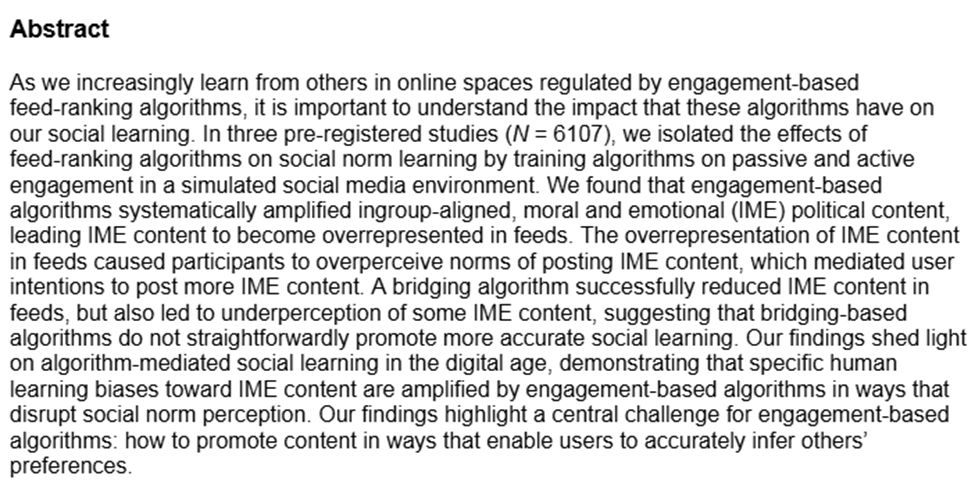
Assistant prof @ Kellogg School of Management, Northwestern University. Studying emotion, morality, social networks, psych of tech. #firstgen college graduate

@merielcd.bsky.social
& Silvan Baier 🧵👇
Reposted by Lisa W. Fazio

www.nasonline.org/award/trolan...
Reposted by William J. Brady


papers.ssrn.com/sol3/papers....
It is perhaps foolhardy to attempt to say something new about a topic as widely studied as empathy. I tried anyway! 1/
Reposted by William J. Brady, Melanie C. Green

theconversation.com/ai-generated...
Reposted by William J. Brady, Allison Eden

With @mattgrizz.bsky.social @andyluttrell.bsky.social @chasmonge.bsky.social
www.nature.com/articles/s41...



www.pnas.org/doi/10.1073/...
Reposted by Mark J. Brandt, William J. Brady, Sylvia Perry
“Why Reform Stalls: Justifications of Force Are Linked to Lower Outrage and Reform Support.”
Why do some cases of police violence spark reform while others fade? We look at how people explain them—through justification or outrage.
osf.io/preprints/ps...

Examining news on 7 platforms:
1)Right-leaning platforms=lower quality news
2)Echo-platforms: Right-leaning news gets more engagement on right-leaning platforms, vice-versa for left-leaning
3)Low-quality news gets more engagement EVERYWHERE - even BlueSky!
www.pnas.org/doi/10.1073/...
Reposted by William J. Brady

Humans are imperfect decision-makers, and autonomous systems should understand how we deviate from idealized rationality
Our paper aims to address this! 👀🧠✨
arxiv.org/abs/2510.25951
a 🧵⤵️
doi.org/10.31234/osf...



Reposted by Scott Clifford, Kate Starbird

Reposted by William J. Brady

Two processes explained this shift:
(1) within-user increases in moral language over time
(2) highly moralized users became more active while less moralized users disengaged osf.io/preprints/ps...
Reposted by Will Jennings, Brendan Nyhan, William J. Brady

😡 The most partisan users — those who love their party and despise the other — are more likely to post about politics
🥊 The result? A loud angry minority dominates online politics, which itself can drive polarization (see doi.org/10.1073/pnas...)
Reposted by Mark J. Brandt
t.co/UDZwJCqDw5
Reposted by William J. Brady
IMO, thinking about identity in an instrumental way helps explain a lot of behavior that seems otherwise baffling.
osf.io/preprints/ps...

osf.io/preprints/ps...
Reposted by Lisa W. Fazio, Arvind Narayanan, Dietram A. Scheufele , and 17 more Lisa W. Fazio, Arvind Narayanan, Dietram A. Scheufele, Dominique Brossard, Marcus Grant, William J. Brady, Daniel Aaron, Robert C. Richards, Veli‐Matti Karhulahti, Trevor A. Branch, Margot C. Finn, Els Torreele, Brian Keegan, Cailin O’Connor, Kate Starbird, Brian Weatherson, Paul Nightingale, Christian Rauh, Dan Immergluck, Will M. Gervais

There we explore how social media companies and other online information technology firms are able to manipulate scientific research about the effects of their products.

👉theory-driven modeling: Hyowon Gweon
👉data-driven discovery: @clemensstachl.bsky.social
👉application: me
👉 panel: @steveread.bsky.social Sandra Matz, @markthornton.bsky.social Wil Cunningham


Across 3 experiments (n = 3,285), we found that interacting with sycophantic (or overly agreeable) AI chatbots entrenched attitudes and led to inflated self-perceptions.
Yet, people preferred sycophantic chatbots and viewed them as unbiased!
osf.io/preprints/ps...
Thread 🧵


